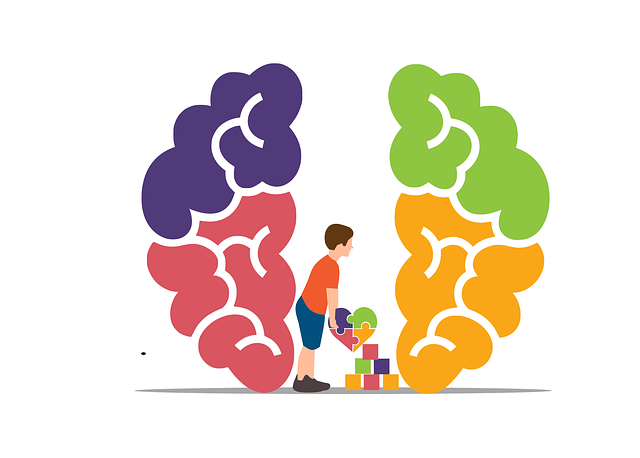Mental health professionals need effective risk management strategies for client safety and positive therapy outcomes, with emotional intelligence as a core competency. Golden Cognitive Processing Therapy (GCPT) is an evidence-based approach that combines cognitive restructuring and communication strategies to enhance emotional intelligence and create safe, supportive environments. By integrating GCPT into robust Risk Management Plans, professionals can proactively address diverse client needs, prevent burnout through self-care, and confidently navigate high-risk situations, ultimately improving both professional effectiveness and client well-being.
Mental health professionals face unique risks in their practice, from patient confidentiality breaches to complex ethical dilemmas. This article guides you through essential risk management planning, focusing on the power of Golden Cognitive Processing Therapy (GCPT) as a proven strategy for mitigation. By understanding risk dynamics and implementing GCPT’s cognitive tools, professionals can build robust comprehensive risk management plans. Learn how this approach enhances patient safety, improves outcomes, and fosters resilience in today’s demanding mental health landscape.
- Understanding Risk in Mental Health Practice
- Implementing Golden Cognitive Processing Therapy (GCPT) as a Risk Mitigation Strategy
- Building a Comprehensive Risk Management Plan
Understanding Risk in Mental Health Practice

Understanding risk is a cornerstone for any mental health professional, as it forms the basis for effective risk management planning. In this context, risk encompasses various factors that could potentially harm clients or negatively impact therapy outcomes. For instance, miscommunication or misunderstandings can lead to distress or even regression in a client’s condition. Moreover, emotional intelligence plays a pivotal role in recognizing and mitigating these risks by fostering open dialogue and promoting positive thinking.
Golden Cognitive Processing Therapy (GCPT), among other evidence-based practices, emphasizes the importance of understanding clients’ cognitive processes and beliefs. By employing effective communication strategies, mental health professionals can help clients reframe negative thoughts, enhancing their emotional intelligence and overall well-being. This proactive approach ensures that potential risks are addressed promptly, creating a safe and supportive environment conducive to growth.
Implementing Golden Cognitive Processing Therapy (GCPT) as a Risk Mitigation Strategy

Implementing Golden Cognitive Processing Therapy (GCPT) can significantly enhance risk management strategies for mental health professionals. GCPT focuses on improving clients’ cognitive processing and emotional regulation, thereby reducing the occurrence of distressing events that might escalate into risks. By training individuals in this evidence-based therapy, practitioners can equip them with effective coping mechanisms to navigate challenging situations, fostering mental wellness and building resilience.
This therapeutic approach goes beyond traditional social skills training by delving into the cognitive roots of emotional responses. It teaches individuals to identify and challenge negative thought patterns, replacing them with healthier alternatives. This process not only prevents risk factors from materializing but also empowers clients to actively manage their mental health proactively. Through GCPT, mental health professionals can offer a holistic approach that combines cognitive restructuring with practical skills, ultimately enhancing the effectiveness of risk mitigation efforts.
Building a Comprehensive Risk Management Plan

Creating a robust Risk Management Plan is an integral part of ensuring the well-being and effectiveness of mental health professionals. This plan should be a comprehensive guide tailored to address potential risks and challenges unique to the field, including those related to complex cases and diverse client populations. A strategic approach involves integrating evidence-based practices such as Golden Cognitive Processing Therapy (GCPT), which focuses on early intervention and prevention strategies.
By incorporating crisis intervention guidance and empathy-building techniques into daily practice, professionals can mitigate risks and enhance their ability to support clients effectively. Additionally, the plan should emphasize self-care strategies to prevent burnout and promote resilience, particularly when dealing with high-risk cases or experiencing emotional distress. This proactive approach enables mental health professionals to navigate complex situations with confidence and maintain a healthy work-life balance while providing exceptional care.
Mental health professionals must proactively manage risks to provide safe and effective care. By understanding the unique risks inherent in their practice, such as complex client scenarios and high-stress environments, practitioners can implement evidence-based strategies like Golden Cognitive Processing Therapy (GCPT) to mitigate these dangers. A comprehensive risk management plan that integrates GCPT principles ensures a structured approach to identifying, assessing, and addressing potential hazards, fostering a more secure working environment for both professionals and their clients.














